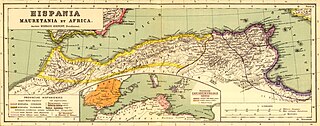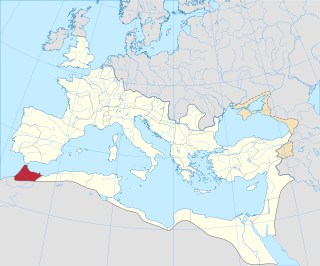Related Research Articles

Mauretania is the Latin name for a region in the ancient Maghreb. It stretched from central present-day Algeria westwards to the Atlantic, covering northern Morocco, and southward to the Atlas Mountains. Its native inhabitants, seminomadic pastoralists of Berber ancestry, were known to the Romans as the Mauri and the Masaesyli.

Mauretania Tingitana was a Roman province located in the Maghreb, coinciding roughly with the northern part of present-day Morocco. The territory stretched from the northern peninsula opposite Gibraltar, to Sala Colonia and Volubilis to the south, and as far east as the Mulucha river. Its capital city was Tingis, which is the modern Tangier. Other major cities of the province were Iulia Valentia Banasa, Septem, Rusadir, Lixus and Tamuda.
Cohors quinta Delmatarum civium Romanorum was a Roman auxiliary infantry regiment. It is named after the Dalmatae, an Illyrian-speaking tribe that inhabited the Adriatic coastal mountain range of the eponymous Dalmatia. The ancient geographer Strabo describes these mountains as extremely rugged, and the Dalmatae as backward and warlike. He claims that they did not use money long after their neighbours adopted it and that they "made war on the Romans for a long time". He also criticises the Dalmatae, a nation of pastoralists, for turning fertile plains into sheep pasture. Indeed, the name of the tribe itself is believed to mean "shepherds", derived from the Illyrian word delme ("sheep"). The final time this people fought against Rome was in the Illyrian revolt of AD 6-9. The revolt was started by Dalmatae auxiliary forces and soon spread all over Dalmatia and Pannonia. The resulting war was described by the Roman writer Suetonius as the most difficult faced by Rome since the Punic Wars two centuries earlier. But after the war, the Dalmatae became a loyal and important source of recruits for the Roman army.
The gens Sertoria was a minor plebeian family at ancient Rome. Few members of this gens appear in history, the most illustrious of whom was the Roman general Quintus Sertorius, who defied the dictator Sulla and his allies for a decade after the populares were driven from power in Rome.
The gens Rutilia was a plebeian family at ancient Rome. Members of this gens appear in history beginning in the second century BC. The first to obtain the consulship was Publius Rutilius Rufus in 105 BC.
The Cohors I Asturum et Callaecorum was a Roman auxilia unit.

Quintus Julius Cordinus Gaius Rutilius Gallicus was a Roman senator who held several posts in the emperor's service. He was twice suffect consul: for the first time in the nundinium of September to October 70 AD; and the second time in 85 with Lucius Valerius Catullus Messalinus as his colleague, succeeding the Emperor Domitian.
The gens Seia was a minor plebeian family of equestrian rank at ancient Rome. Members of this gens are first mentioned in the time of Cicero, and a few of them held various magistracies under the late Republic and into imperial times.
Marcus Gavius Maximus was an eques of ancient Rome who held several imperial positions, both civil and military, under Hadrian and Antonius Pius.
Quintus Baienus Blassianus was a Roman eques who held a number of military and civilian positions during the reign of the Emperors Antonius Pius and Marcus Aurelius, including praefectus of the Classis Britannica, and of Roman Egypt.
Gaius Valerius Eudaemon was a Roman eques who held a number of military and civilian positions during the reigns of the Emperors Hadrian and Antonius Pius, which includes praefectus of Roman Egypt. He is known as a close friend of the emperor Hadrian.
Quintus Caecilius Redditus was a Roman eques who held a number of appointments during the reigns of the Emperors Trajan and Hadrian. He is known in a series of inscriptions.
Gaius Junius Flavianus was a Roman eques who held a number of appointments in the second century AD. He is known from a series of inscriptions.
Decimus Veturius Macrinus was a Roman eques who is known to have held imperial appointments under both emperors Commodus and Septimius Severus. He is best known for being governor of Roman Egypt under Commodus and praetorian prefect under Severus.
Sextus Sentius Caecilianus was a Roman senator, who was active during the first century AD. He was suffect consul in an undetermined nundinium during the reign of Vespasian. He is known entirely from inscriptions.
Publius Besius Betuinianus Gaius Marius Memmius Sabinus was a Roman eques who held a number of military and civilian positions during the reign of the Emperor Trajan, and was twice decorated for his actions in battle. He is only known from inscriptions.
Tiberius Claudius Secundinus Lucius Statius Macedo was a Roman eques who held a number of appointments in the second century AD, the best known of which was praefectus annonae, or overseer of the food supply of Rome. Macedo is known only from a series of inscriptions.
Marcus Petronius Honoratus was a Roman eques who held a number of military and civilian positions during the reigns of the Emperors Hadrian and Antonius Pius, which included praefectus annonae and praefectus or governor of Roman Egypt.
John Edward Houghton Spaul (1926–2018), known as J. E. H. Spaul and sometimes John Spaul, was a British ancient historian and epigrapher. Much of his work focused on the Army of the Roman Empire.
References
- ↑ AE 1942/43, 69
- ↑ CIL VIII, 21826
- ↑ Spaul, "Governors of Tingitana", in Antiquités Africaines, 30 (1994), p. 245